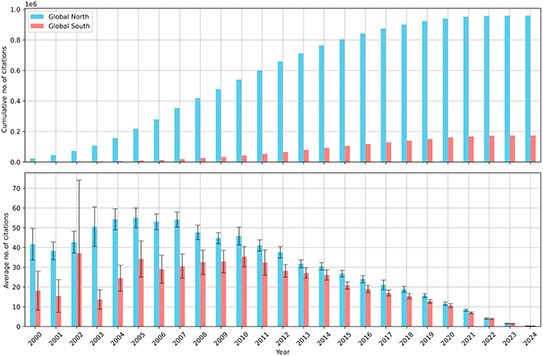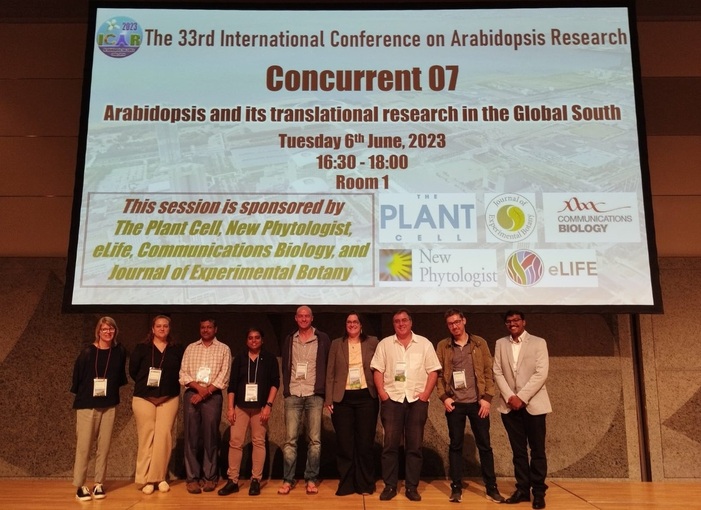Translated from an original press release by Luciana Díaz (Agencia CYTA).
In an article in the journal New Phytologist, a group of researchers led by José M. Estevez and Gabriela Auge call for reflection on the inequalities they face in their discipline, in comparison to their colleagues in the Global North.
Although the work carried out in the field of plant biology by researchers from countries in the Global South is of high quality and their contributions are relevant to the discipline, their recognition at the international level is far from that received by their peers in the Global North. To highlight this situation, the journal New Phytologist published an article written by José Manuel Estevez, head of the Laboratory of Molecular Basis of Plant Development at Fundación Instituto Leloir, Argentina, and plant specialist Gabriela Auge, in which they explain the possible reasons behind these inequalities and propose ways to address the challenges in overcoming them.
'We try to show that although our community is thriving, the recognition does not match the impact that our work has in the field,' explains Auge, who leads the Plant Environmental Memory Laboratory at the Institute of Agrotechnology and Molecular Biology (IABIMO), which is part of INTA and CONICET in Argentina. 'I am sure that this is not something exclusive to those of us who do research in plants, but that it also happens in other fields of science,' she emphasises.
Recent studies show that articles on plant biology written by North American authors receive, on average, twice as many citations as those from Latin American countries and sub-Saharan Africa, despite being published in journals with similar impact factors. This discrepancy is even more evident in ‘elite’ journals (with an impact factor greater than 7), where the difference can be quadrupled.

Citations of Arabidopsis articles in the Global North and the Global South.
'National publication rates are positively correlated with GDP and R&D expenditure, with the majority of publications coming from the United States, Western European countries and China,' the authors state in the article. 'However, emerging economies such as India, Brazil, Iran, South Africa, Mexico and Argentina have also made notable contributions to increasing research output in upper-middle-income countries.'
On the other hand, Auge and Estevez highlight the lack of representation of researchers from the Global South in scientific spaces due to a lack of invitations or not being included in decision-making processes. 'In general, the South is a place of 'resource extraction', which disadvantages and excludes the local scientific community,' says Auge.
Among the solutions, the authors propose establishing committees at conferences that include a greater diversity of organising members and, consequently, of speakers; involving specialists from the Global South in decision-making positions; and improving the community's access to various working tools, among others.
'This requires the will to carry out actions and changes in scientific policies and investments, which are sometimes not easy.to achieve, such as providing access to sources of funding for our communities, promoting the creation of collaborative networks with scientists from the Global South in leading roles, or facilitating funding for mobility,' Estevez explains.
The first big step
Thanks to the efforts of Auge and Estevez, the International Conference on Arabidopsis Research, held in Japan in June 2023, featured – for the first time in the conference’s 33-year history – an international symposium on research advances using the model plant, Arabidopsis thaliana, from countries in the Global South.
'At that conference, both José and I were invited to give plenary presentations, which demonstrated the commitment of the organising committee to show the work of people beyond the core countries. However, the financial support to ensure the attendance of many, including the two of us and the speakers at the session we organised, had to come from personal efforts to obtain external funding,' Auge highlights. She adds: 'We managed to get several journals to sponsor us, which allowed us to reimburse travel expenses. This shows that there is a commitment to diversifying the panels of speakers and the editorial process, but it is clearly something that needs to keep growing.'

Participants in the 'Arabidopsis and its translational research in the Global South' session at ICAR 2023.
This page has been imported from a previous website. If you spot any errors on this page please contact us with the URL of the page and a description of the error so we can correct it.
